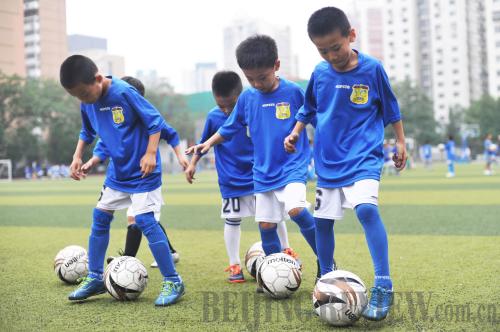|
 |
|
PLAYING FOR FUN: Students at a soccer club in Beijing receive training in June (WEI YAO) |
According to data from the GAS, China's average area of sport facilities had stood at only 1.2 square meters per person by the end of 2010, much lower than neighboring countries like Japan and South Korea.
Meanwhile, distribution of sports facilities is not even. Community sports facilities took a relatively small proportion compared to large stadiums, and utilization of what facilities are available was also low, according to the GAS data.
"In the guidelines, a newly developed residential community that's home to some 3,000 people will be required to have at least six ping-pong tables for its indoor sports facilities. While its outdoor workout space should be over 900 square meters, the size of one and a half basketball courts," said Hao with the NDRC.
Meanwhile, the guidelines said China will support the sports sector by eliminating industrial and policy barriers to form a policy system that is conducive to the sector's rapid growth.
The country will encourage social capital to invest in the industry, including construction of sports facilities and providing related products and services, according to the guidelines.
It will also expand the opening up of the sector by encouraging foreign capital to invest in the industry.
Liu Fumin, Director of the GAS' Department of Finance, said the moves will unleash the vigor of social capital, boost the sports sector's growth and stimulate Chinese people's demand for sports, leisure and fitness.
"An increasingly mature sports market will offer great opportunities for foreign companies," Liu said.
Foreign enterprises account for just 1.55 percent of all service companies in the industry, and the number of foreign sporting goods companies accounts for 23 percent of the total, said Liu.
"There are great opportunities for foreign investors, particularly in areas such as sporting events, overseas sports tourism and venue management, where their strengths are clear," he added.
The guidelines include measures for lessening the paperwork for sports event approvals, which will help the industry attract more funds.
He Wenyi, a sports industry researcher with Peking University's Research Institute for Sports Science, said that ownership and intellectual property rights of many sports events were "ambiguous" in China.
Currently, all sports events are subject to the approval of the GAS and its local bureaus. These sports watchdogs charge fees based on an event's importance and ability to attract advertisers.
Zhang Qing, founder of Key-Sports, a consulting and research agency, said the changes have the potential to alter the status quo in the sports industry, but could be difficult to carry out because those with vested interests will oppose them.
"If you purchase real estate but you don't have the property rights, that will greatly dampen the enthusiasm of investors," Zhang said.
Zhang said the sole investor of the CBA, which pays $1.5 million annually as an approval fee, started to see a profit only last year.
But he predicted that change will take place gradually since it intends to take back the biggest income source of sports watchdogs.
Unlike Zhang's cautiousness, He firmly believes that the new policy on event approvals will help ease some concerns among investors and bring more funds into the sports sector.
"Increasing investment in the sector, including sports facilities, will create a 'new generation of consumers,' which will benefit foreign and domestic investors," said He.
Meanwhile, the guidelines also encourage the involvement of private capital in the industry and the listing of qualified companies.
Zhang Yuxian, a researcher at the NDRC's Information Center, said more domestic sports companies are on track to be listed. The number of listed companies remains relatively low and many focus on property or other business related to sports, rather than sports themselves.
More sports service companies such as event managers or stadium management companies will go public, he said.
The guidelines encourage sports companies to expand their sources of funding with debt issues.
The authorities plan to designate new hi-tech sports companies as being eligible for a 15-percent reduction in income tax.
Sports companies can qualify for a sales tax rate as low as 3 percent, said Liu. He added these financial and tax preferences could be in place in one or two years.
The guidelines also encourage qualified gymnasiums to establish chain stores across regions.
"This is good news. Under the new guidelines we can have a market-oriented sports industry," said Shi Fengling, Chairperson of Beijing Fanhuaxinxing Sports Co. "More capital and private enterprises will join us, and we will have a more robust growth potential."
Yang Renwen, a senior analyst at Founder Securities Co. Ltd. headquartered in Beijing, said that investors see great opportunities in three sectors: sports events, gym clubs and intelligent sporting goods.
A sample sport
Concerning one of the major targets of the guidelines, the State Council announced it will take measures to promote popularization of three particular ball sports—soccer, basketball and volleyball.
Specifically, the government will set up long-term development plan for soccer, which is relatively undeveloped compared to other ball sports in China, encompassing construction of sports facilities and promotion of soccer on campuses.
In fact early in July, the Central Government, in the wake of its national football team failing to qualify for the last three FIFA World Cups, decided to improve football standards at schools and universities.
Education Minister Yuan Guiren said at a national sports education symposium that football training at schools and universities would be prioritized, the China Education Daily reported on July 30.
A four-tier league system covering primary schools, high schools and universities will be introduced, opening a growth channel for young football talent and building a substantial reserve of skilled soccer players, said Yuan at the symposium.
| 